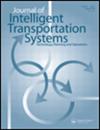基于自适应图卷积网络的地铁短期客流预测
IF 2.8
3区 工程技术
Q3 TRANSPORTATION
Journal of Intelligent Transportation Systems
Pub Date : 2024-11-01
DOI:10.1080/15472450.2023.2209913
引用次数: 0
摘要
随着城市化进程的发展和加快,城市地铁交通逐渐成长为一个大型网络,站点间的拓扑结构也变得越来越复杂,使得空间依赖性的捕捉变得越来越困难。多条线的纵横交错使得台站呈拓扑分布,传统的图卷积是基于先验知识生成的邻接矩阵实现的,无法反映台站之间的实际空间依赖性。为了解决这些问题,本文提出了一种自适应图卷积网络模型(Adapt-GCN),该模型将传统GCN中由先验知识获得的固定邻接矩阵替换为可训练的自适应邻接矩阵。这不仅可以有效地调整相邻台站之间的相关权重,而且可以自适应地捕获非相邻台站之间的空间依赖关系。本文使用上海地铁数据集验证了该模型在提高预测精度和减少训练时间方面的有效性。本文章由计算机程序翻译,如有差异,请以英文原文为准。
Adaptive graph convolutional network-based short-term passenger flow prediction for metro
With the development and acceleration of urbanization, urban metro traffic is gradually growing up to a large network, and the structure of topology between stations becomes more complex, which makes it increasingly difficult to capture the spatial dependency. The vertical and horizontal interlacing of multiple lines makes the stations distributed topologically, and the traditional graph convolution is implemented on the adjacency matrix generated based on a priori knowledge, which cannot reflect the actual spatial dependence between stations. To address these problems, this paper proposes an adaptive graph convolutional network model (Adapt-GCN), which replaces the fixed adjacency matrix obtained from a priori knowledge in the traditional GCN with a trainable adaptive adjacency matrix. This can not only effectively adjust the weights of correlations between adjacent stations, but also adaptively capture the spatial dependencies between non-adjacent stations. This paper uses the Shanghai Metro dataset to verify the effectiveness of the model in improving prediction accuracy and reducing training time.
求助全文
通过发布文献求助,成功后即可免费获取论文全文。
去求助
来源期刊
CiteScore
8.80
自引率
19.40%
发文量
51
审稿时长
15 months
期刊介绍:
The Journal of Intelligent Transportation Systems is devoted to scholarly research on the development, planning, management, operation and evaluation of intelligent transportation systems. Intelligent transportation systems are innovative solutions that address contemporary transportation problems. They are characterized by information, dynamic feedback and automation that allow people and goods to move efficiently. They encompass the full scope of information technologies used in transportation, including control, computation and communication, as well as the algorithms, databases, models and human interfaces. The emergence of these technologies as a new pathway for transportation is relatively new.
The Journal of Intelligent Transportation Systems is especially interested in research that leads to improved planning and operation of the transportation system through the application of new technologies. The journal is particularly interested in research that adds to the scientific understanding of the impacts that intelligent transportation systems can have on accessibility, congestion, pollution, safety, security, noise, and energy and resource consumption.
The journal is inter-disciplinary, and accepts work from fields of engineering, economics, planning, policy, business and management, as well as any other disciplines that contribute to the scientific understanding of intelligent transportation systems. The journal is also multi-modal, and accepts work on intelligent transportation for all forms of ground, air and water transportation. Example topics include the role of information systems in transportation, traffic flow and control, vehicle control, routing and scheduling, traveler response to dynamic information, planning for ITS innovations, evaluations of ITS field operational tests, ITS deployment experiences, automated highway systems, vehicle control systems, diffusion of ITS, and tools/software for analysis of ITS.

 求助内容:
求助内容: 应助结果提醒方式:
应助结果提醒方式:


